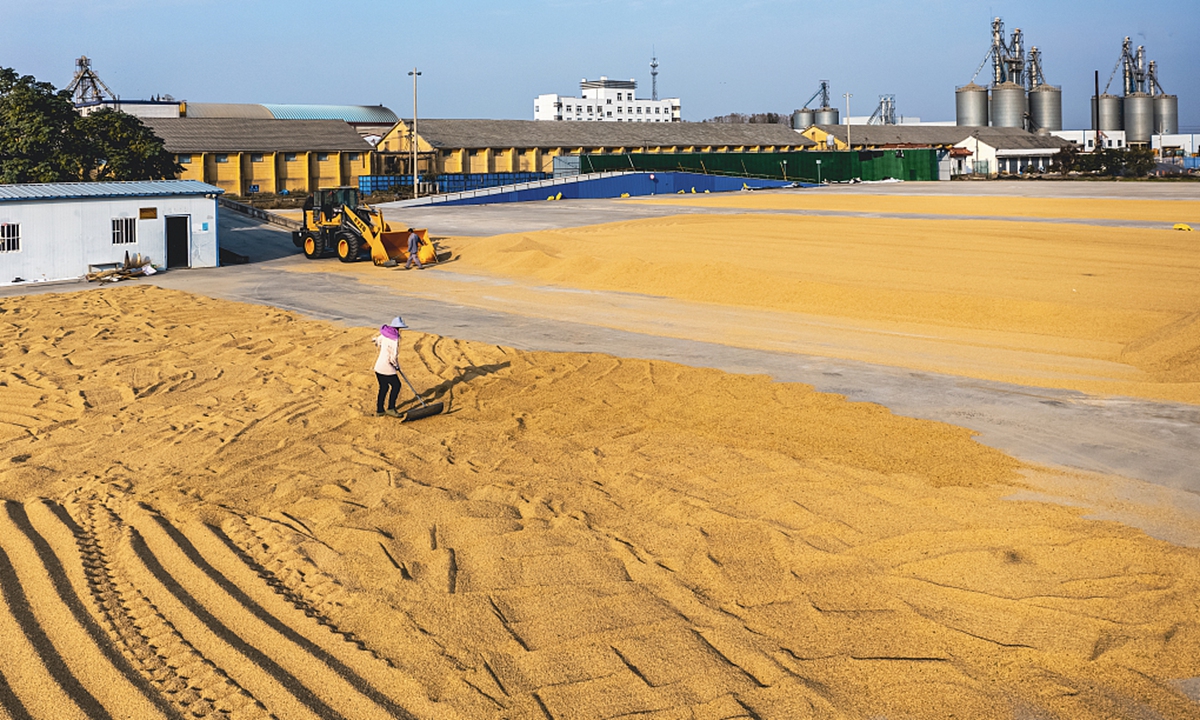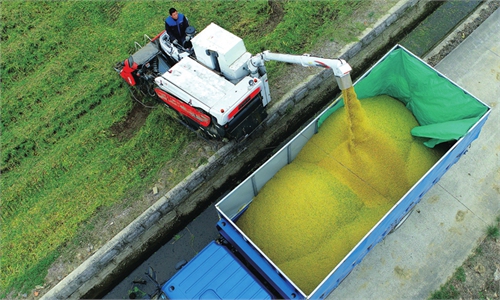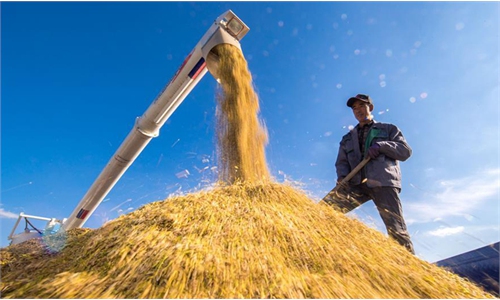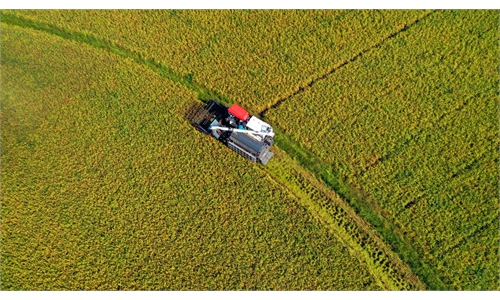China’s record grain output helps ensure food security amid external uncertainties
Major progress helps ensure food security amid uncertainties: experts

Farmers are drying grain in Huaian, Jiangsu Province on November 2, 2021. Photo: VCG
China's domestic grain output reached a new record in 2021, laying a solid foundation for the country to secure stable grain supplies despite external uncertainties posed by geopolitics and the COVID-19 pandemic, officials and experts said on Monday.
In 2021, China's total grain production reached 1.37 trillion jin (685 billion kilograms), hitting a new record high, data from the National Bureau of Statistics (NBS) showed on Monday.
Production increased by 26.7 billion jin, or 2 percent year-on-year and grain output has now exceeded 1.3 trillion jin for seven consecutive years, according to the NBS data.
The increase in output was a result of growing planting area, as the government took measures to protect arable land such as developing winter fallow fields and increasing support for grain producers.
According to the NBS data, China's total grain planting area stood at 1.764 billion mu (106 million hectares) in 2021, up 12.95 million mu or 0.7 percent compared with the previous year. The sowing areas of corn and wheat increased by 5 percent and 0.8 percent on a yearly basis in 2021, while the sowing area of rice decreased by a slight 0.5 percent.
In particular, the sowing area of soybeans decreased by 14.8 percent year-on-year to 126 million mu in 2021, which the NBS mainly attributed to farmers' reluctance to grow the crop, given its relatively low profit compared with corn.
Jiao Shanwei, editor-in-chief of industry news website cngrain.com, said that China's soybean imports have been relatively stable over the years, and it's difficult to reduce the soybean supply-demand gap by relying on domestic soybeans.
"China consumes about 110 million tons of soybeans each year, with only 10-20 million tons produced domestically," Jiao told the Global Times on Monday.
However, he noted that China no longer imports most of its soybeans from the US and has diversified import sources to include places like Brazil.
Currently, about 60 percent of China's soybean imports are from Brazil, while only about 30 percent are from the US. China is also actively expanding its soybean import channels to other sources such as Russia and some Southeast Asian nations.
Officials and experts stressed that China's stable and high-level grain output has provided strong support for the country to secure grain supply amid a complicated global geopolitical situation and challenges like the COVID-19 pandemic.
According to Jiao, China has always put an emphasis on grain security, and has further intensified such efforts after the emergence of challenges in recent years, including extreme weather and the COVID-19, which compelled certain regions in the world to decrease crop production.
Jiao said that protectionism and unilateralism in some countries have also affected food trade, which poses risks to certain products and industries that rely on imports. For example, many sources of farm crops are dominated by overseas companies, which will mean risks of supply disruption if China does not break through technical bottlenecks.
However, experts expressed confidence that China has the ability to secure grain supply with its own production, as it has already achieved grain self-sufficiency, with only an appropriate level of imports.
Ma Wenfeng, a senior analyst at the Beijing Orient Agribusiness Consultancy, said that China's level of grain security, especially for certain crops like wheat and corn, "largely surpasses" most countries in the world.
Ma told the Global Times that China's growing grain output has been facilitated by factors such as recent progress in farming technologies, including the conversion of household food waste into fertilizers to increase farming productivity. Besides, China has developed a number of high-tech facilities like farming drones that have helped increase grain yields.
According to Ma, China's efforts to maintain grain security will support the stability of the world grain market, as grain prices will fluctuate widely if China imports a large amount of grain.




